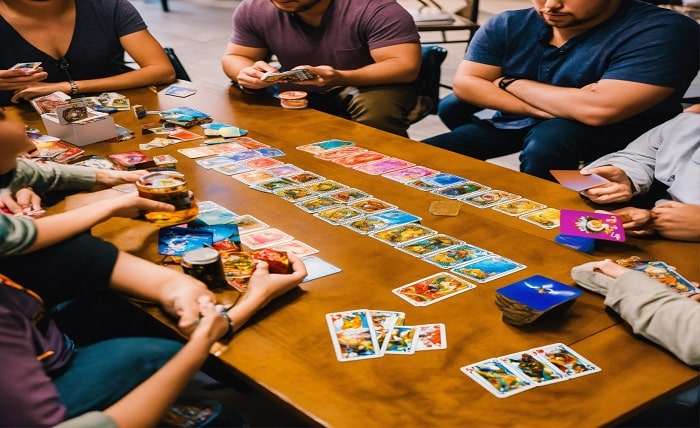What Do Cards Do in 99math? A Comprehensive Guide

99math is an engaging and educational math platform designed for students to practice and improve their math skills. One of the key features of this platform is the use of “cards” in various game modes, which makes learning math fun and interactive. But what do cards do in 99math? This question has intrigued many players, educators, and parents who want to understand how these cards contribute to both the gameplay experience and educational outcomes.In this blog post, we will explore the role of cards in 99math, how they enhance the gameplay, and their impact on learning. Whether you’re a teacher, parent, or student, this guide will help you better understand the function of cards in the 99math platform.
What Are Cards in 99math?
To understand what cards do in 99math, we first need to define what these cards are. In the context of 99math, cards are virtual items used to facilitate interactive gameplay. The platform incorporates these cards into different math games and challenges, allowing players to engage with the content in a dynamic and rewarding way.Each card typically features a number or mathematical concept that players need to identify or solve in order to progress in the game. These cards are designed to be visually appealing and easy to use, ensuring that the focus remains on learning math rather than navigating complex gameplay mechanics.The cards serve as the core mechanic in many of the game modes, helping to introduce various mathematical concepts such as addition, subtraction, multiplication, and division in an interactive and engaging way.
How Do Cards Work in 99math Games?
The primary function of cards in 99math is to drive the gameplay forward and make learning fun. In different game modes, cards are either drawn, played, or solved in various ways. For example, in a multiplayer setting, players might be asked to answer questions that involve choosing the correct card based on a mathematical problem or solving equations presented on the cards.In games like “Card Rush,” players are tasked with solving math problems quickly to collect the correct cards. The more cards they collect, the higher their score. These cards might represent different math operations or levels of difficulty, and players are encouraged to progress through different stages as they solve problems accurately and swiftly.By incorporating cards into gameplay, 99math creates a competitive environment where students can challenge themselves and their peers while reinforcing math concepts through practice.
Cards as Learning Tools in 99math
One of the most exciting aspects of what cards do in 99math is their role as learning tools. The platform isn’t just about gaming; it’s a valuable educational resource designed to support students in mastering key math skills. Each card is a small step toward mastering a specific math concept. The cards feature questions or problems that range from simple arithmetic to more complex problems involving fractions, percentages, and equations.As players progress through the levels, the cards they encounter can become more challenging. This progression allows students to build confidence and knowledge at their own pace, ensuring that they aren’t overwhelmed by content that is too difficult.In addition to mathematical operations, cards in 99math may also feature visual representations of math problems, helping students understand abstract concepts by connecting them to more concrete, visual examples. This integration of visual learning with hands-on gameplay makes 99math a highly effective platform for various learning styles.
The Role of Cards in Competitions and Multiplayer Modes
When students engage in multiplayer modes in 99math, cards take on a more competitive role. Players are grouped into teams or participate in individual competitions where the objective is to solve math problems faster than the opponent. The cards in these modes can be used as tools to answer questions correctly and score points, and the faster the player solves the problem, the more points they earn.In competitive modes, cards can be used to block opponents or gain an advantage by selecting the most efficient solution. This creates a dynamic and engaging atmosphere where players need to strategize not just for learning but also for competition.For example, some cards may act as power-ups, giving players additional time to answer questions or the ability to skip particularly difficult problems. Other cards may slow down opponents or provide hints to help players solve complex math challenges more efficiently. These elements enhance the competitive aspect of the game while still maintaining the educational focus.
Customization of Cards for Personalized Learning
Another fascinating feature of cards in 99math is their ability to be customized. Depending on the settings, educators can modify or tailor the types of cards students encounter to match their specific learning needs. This level of customization allows for a more personalized learning experience, which is particularly valuable in classrooms with diverse skill levels.For instance, a teacher might choose to focus on certain math topics, such as multiplication tables or solving word problems, and create custom card decks that target those specific areas. As a result, students can practice and improve in areas where they need the most support, ensuring they are challenged appropriately.This feature of cards in 99math allows both students and educators to adjust the game’s difficulty level, promoting a balanced learning experience. Students can play with cards that match their current skill level while progressing toward more advanced topics as they grow.
The Impact of Cards on Student Engagement and Motivation
A major advantage of using cards in 99math is the effect they have on student engagement and motivation. Traditional math lessons can sometimes feel repetitive or boring, especially when students are asked to solve problems from a textbook. However, the use of cards in 99math transforms math into a more interactive and enjoyable experience.When students play with cards, they are motivated by the instant feedback they receive from the game. The reward system, where students earn points or rewards for correctly solving problems, keeps them engaged and encourages them to continue playing. As they collect more cards, their sense of accomplishment grows, driving them to keep practicing and improving their math skills.Moreover, the competitive aspect of multiplayer modes, where players can challenge friends or classmates, further motivates students to practice. They want to do well and show off their mathematical abilities, and the cards play a key role in driving this healthy competition.
How Cards Help with Skill Development in 99math
Lastly, cards in 99math are integral to developing specific math skills. By using cards in various game modes, students practice different areas of mathematics such as:
- Mental Math: Players solve problems quickly to collect cards, helping them improve their mental math speed and accuracy.
- Problem Solving: Cards that feature equations or word problems help students hone their problem-solving skills.
- Numerical Fluency: The card games encourage players to become more familiar with numbers, helping them recognize patterns and relationships between different math concepts.
- Critical Thinking: Some card modes require players to make quick decisions, fostering critical thinking and strategic problem-solving.
The diverse range of skills that students develop through card games in 99math ensures they get well-rounded practice and experience in a fun, gamified setting.
Conclusion
So, what do cards do in 99math? They serve as an interactive and integral part of the platform that promotes learning through play. The cards help students engage with mathematical concepts in a more hands-on way, encouraging them to solve problems quickly and accurately while having fun. Whether used in single-player or multiplayer modes, cards in 99math facilitate skill development, personalized learning, and motivation. They transform traditional math lessons into an exciting and dynamic learning experience, making math more accessible and enjoyable for students of all ages.
FAQs
- What types of cards are used in 99math? Cards in 99math feature various mathematical problems, including addition, subtraction, multiplication, division, and word problems. There are also custom cards created by teachers for specific learning needs.
- Can I customize the cards in 99math for my students? Yes, 99math allows educators to customize the cards to suit their students’ needs. Teachers can create specific card decks to target areas where students need the most practice.
- How do cards affect the competitive aspect of 99math? In competitive modes, cards are used to answer math questions, score points, and gain advantages over opponents. Players can earn points by solving problems faster and more accurately.
- Do the cards in 99math help with advanced math concepts? Yes, the cards gradually increase in difficulty, covering basic math skills as well as more advanced concepts such as fractions, percentages, and equations.
- Are the cards in 99math suitable for all age groups? Absolutely! 99math offers a range of difficulty levels, making the platform suitable for both younger children and older students. The cards are designed to be engaging for various age groups, ensuring that everyone can benefit from the platform.




